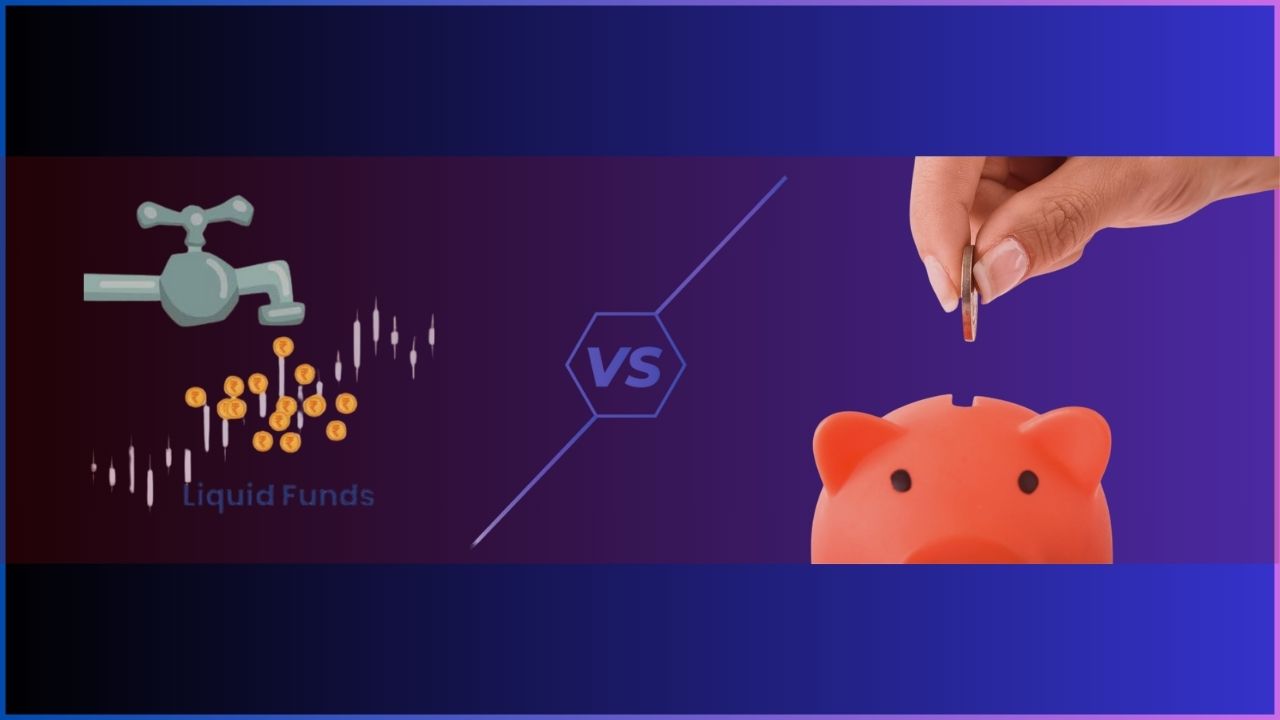When you have spare cash, you may be wondering where to stash it. Two of the most common choices are savings bank accounts and liquid funds. Both are secure and provide some return, but they operate in different ways.
In this blog post, we are going to describe what each choice is and how they compare. This will enable you to choose which one is best for you.
Liquid Funds vs Saving Bank Account: Which is a Better Investment?

Savings Bank Account
A savings bank account is a type of account you can open at a bank. It lets you save money and earn a small amount of interest. Here are some important things to know about savings accounts:
- Safety: Your money is very safe in a savings account. The government protects it up to a certain amount, so you don’t have to worry about losing it.
- Liquidity: You are free to withdraw your money at any time. Banks usually provide you with an ATM card or allow you access through online banking so that you can access money at ease.
- Interest Rates: The interest gained is often low, ranging from 2% to 4% per annum. Some banks may offer you a bit more in interest if you have plenty of money in the account.
- Ease of Use: Opening a savings account is simple, and you can operate it online or via the bank’s mobile app.
But the interest rate is very low, so that your money may not increase much, particularly when prices of things rise (which is referred to as inflation).
Liquid Funds
Liquid funds are a mutual fund. They invest your money in short-term government or corporate loans. These loans are secure and are returned soon, mostly within 91 days. Here are some key things to know about liquid funds:
- Higher Returns: Liquid funds typically yield higher returns than savings accounts. You can receive returns of between 4% and 7% annually, depending on the market’s current state.
- Low Risk: As they lend to secure short-term loans, the risk of losing money is negligible.
- Liquidity: You may get your money back promptly, but it may take one or two days, not immediately as a savings account.
- Minimum Investment: Certain liquid funds require a minimum investment amount, such as Rs. 500.
There are some disadvantages, though. Liquid funds deduct a small charge, known as the expense ratio, from your returns, decreasing them slightly. Also, the returns may vary with the market, i.e., they are not guaranteed.
Liquid Funds vs Savings Bank Account
Following is a basic table comparing savings bank accounts and liquid funds:
| Feature | Savings Bank Account | Liquid Funds |
|---|---|---|
| Returns | 2% – 4% per year | 4% – 7% per year |
| Risk | Very Low | Low |
| Liquidity | Instant access | 1-2 business days |
| Minimum Investment | Usually none | As low as Rs. 500 |
| Fees | None | Small fee (0.1% – 1%) |
| Taxation | Interest is taxable | Capital gains tax applies |
Conclusion
Both savings bank accounts and liquid funds have advantages and disadvantages. If you must be able to access your money immediately and wish it to be extremely safe, a savings bank account is preferable. However, if you can wait a day or two to receive your money and wish to earn more with minimal risk, liquid funds could be more suitable.
The most suitable option is based on what you require. For immediate accessibility, opt for a savings account. For greater growth, choose liquid funds. It’s equally wise to utilize both for various reasons.
FAQs: Liquid Funds vs Savings Bank Account
What is the main difference between a savings account and a liquid fund?
The main difference is in returns and how quickly you can get your money. Savings accounts give lower returns but let you access your money instantly. Liquid funds give higher returns but take a day or two to get your money back.
Are liquid funds safe?
Yes, liquid funds are safe because they invest in short-term, high-quality loans. The risk is low.
Can I lose money in liquid funds?
It’s possible, but the risk is low. You might lose a little if the loans don’t get paid back or if interest rates change suddenly.
How do I invest in liquid funds?
You can invest through mutual fund companies or online platforms that sell mutual funds.
Is there a lock-in period for liquid funds?
No, there is no lock-in period. You can take your money out anytime, but it might take a day or two to process.










